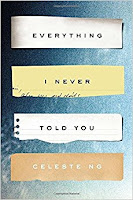A few themes were gleaned within the pages of Spoonbenders. Magic tricks come with a cost. True magic is often times pure luck. Case in point. Daryl Gregory shows that plot can outweigh craft as there is no special legerdemain present with his phrasing, his descriptions. But the story? The characters? Magic.
 Spoonbenders follows the Amazing Telemachus Family, a
one-time TV sensation of psychics and con artists who are now all older,
sadder, and defeated. Irene, the eldest, is a single mother in a dead-end job.
Frankie, who is always looking for the Next Big Thing, owes money everywhere,
including the mob. Buddy is a clairvoyant basket case. Mattie, a teen barely
coming into his own. And Teddy, the patriarch, who might be pulling one last
confidence game in hopes to save everyone.
Spoonbenders follows the Amazing Telemachus Family, a
one-time TV sensation of psychics and con artists who are now all older,
sadder, and defeated. Irene, the eldest, is a single mother in a dead-end job.
Frankie, who is always looking for the Next Big Thing, owes money everywhere,
including the mob. Buddy is a clairvoyant basket case. Mattie, a teen barely
coming into his own. And Teddy, the patriarch, who might be pulling one last
confidence game in hopes to save everyone.
Gregory wisely turns away from setting up yet another X-Men style situation of freaks banding together outside of society in order to save it. Instead, he focuses on the normalcy, the relevancy, of the family dynamic and all its wonders: puberty, unemployment, sickness, marriage, failed dreams. He asks how can fame, something that was once briefly tasted, be regained? He sets up a ticking clock and a countdown to one glorious dénouement of card sharking, astral projection and, perhaps, with some luck, a little spoonbending as the reader is treated to a story full of amazement and wonder. And why not? Magic.
Many thanks to NetGalley and Knoff for this entertaining, magical read.
As Always,
theJOE

